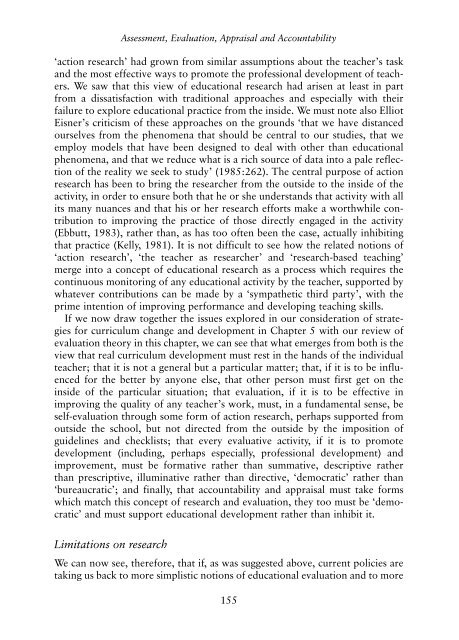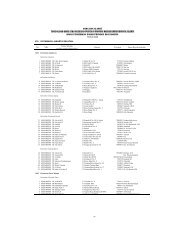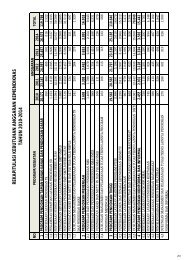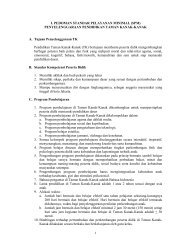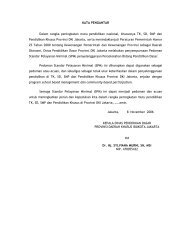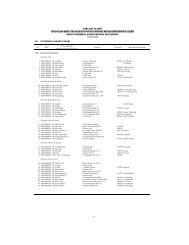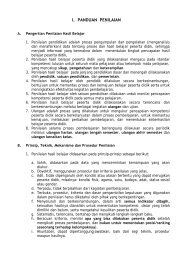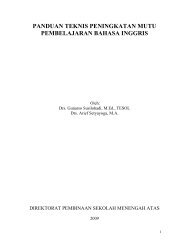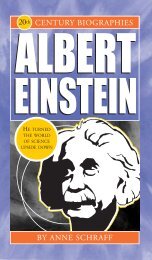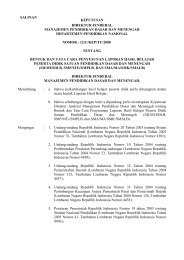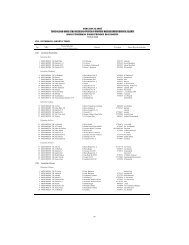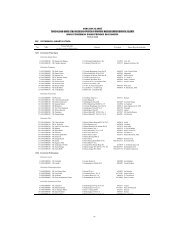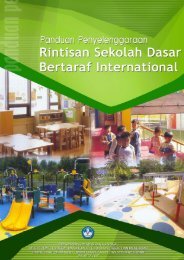The Curriculum - WordPress.com
The Curriculum - WordPress.com
The Curriculum - WordPress.com
Create successful ePaper yourself
Turn your PDF publications into a flip-book with our unique Google optimized e-Paper software.
Assessment, Evaluation, Appraisal and Accountability‘action research’ had grown from similar assumptions about the teacher’s taskand the most effective ways to promote the professional development of teachers.We saw that this view of educational research had arisen at least in partfrom a dissatisfaction with traditional approaches and especially with theirfailure to explore educational practice from the inside. We must note also ElliotEisner’s criticism of these approaches on the grounds ‘that we have distancedourselves from the phenomena that should be central to our studies, that weemploy models that have been designed to deal with other than educationalphenomena, and that we reduce what is a rich source of data into a pale reflectionof the reality we seek to study’ (1985:262). <strong>The</strong> central purpose of actionresearch has been to bring the researcher from the outside to the inside of theactivity, in order to ensure both that he or she understands that activity with allits many nuances and that his or her research efforts make a worthwhile contributionto improving the practice of those directly engaged in the activity(Ebbutt, 1983), rather than, as has too often been the case, actually inhibitingthat practice (Kelly, 1981). It is not difficult to see how the related notions of‘action research’, ‘the teacher as researcher’ and ‘research-based teaching’merge into a concept of educational research as a process which requires thecontinuous monitoring of any educational activity by the teacher, supported bywhatever contributions can be made by a ‘sympathetic third party’, with theprime intention of improving performance and developing teaching skills.If we now draw together the issues explored in our consideration of strategiesfor curriculum change and development in Chapter 5 with our review ofevaluation theory in this chapter, we can see that what emerges from both is theview that real curriculum development must rest in the hands of the individualteacher; that it is not a general but a particular matter; that, if it is to be influencedfor the better by anyone else, that other person must first get on theinside of the particular situation; that evaluation, if it is to be effective inimproving the quality of any teacher’s work, must, in a fundamental sense, beself-evaluation through some form of action research, perhaps supported fromoutside the school, but not directed from the outside by the imposition ofguidelines and checklists; that every evaluative activity, if it is to promotedevelopment (including, perhaps especially, professional development) andimprovement, must be formative rather than summative, descriptive ratherthan prescriptive, illuminative rather than directive, ‘democratic’ rather than‘bureaucratic’; and finally, that accountability and appraisal must take formswhich match this concept of research and evaluation, they too must be ‘democratic’and must support educational development rather than inhibit it.Limitations on researchWe can now see, therefore, that if, as was suggested above, current policies aretaking us back to more simplistic notions of educational evaluation and to more155


